Unit 7 I used to be afraid of the dark辅导讲义(表格式)
文档属性
| 名称 | Unit 7 I used to be afraid of the dark辅导讲义(表格式) |
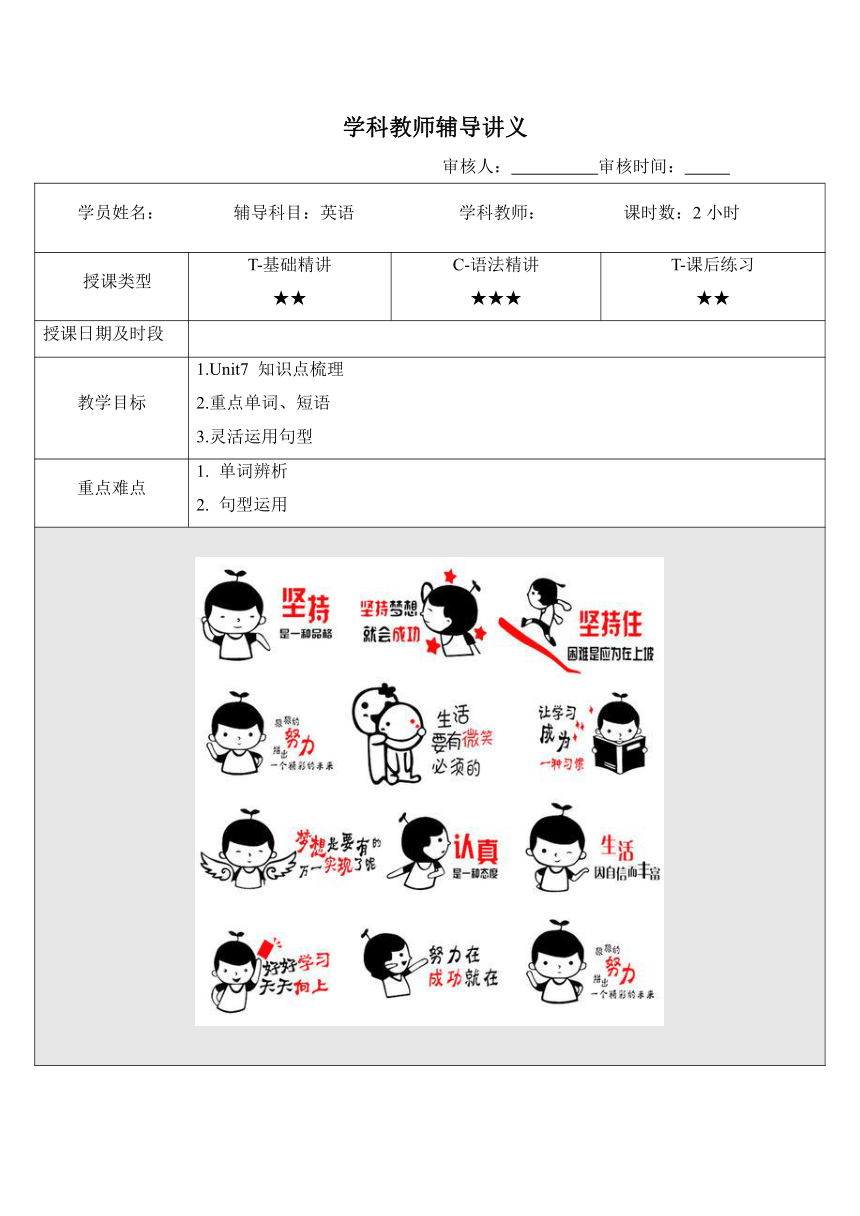
|
|
| 格式 | docx | ||
| 文件大小 | 536.0KB | ||
| 资源类型 | 教案 | ||
| 版本资源 | 鲁教版 | ||
| 科目 | 英语 | ||
| 更新时间 | 2023-08-02 00:00:00 | ||
图片预览

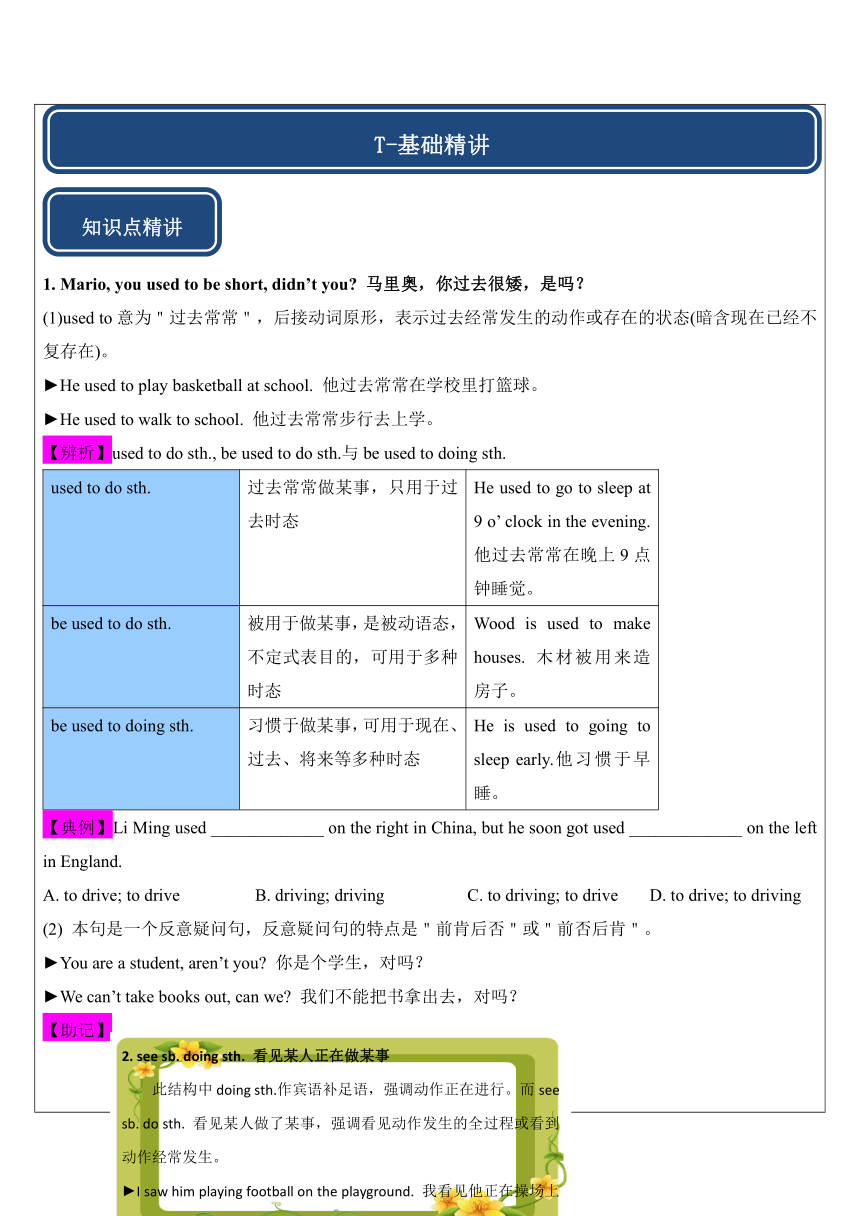
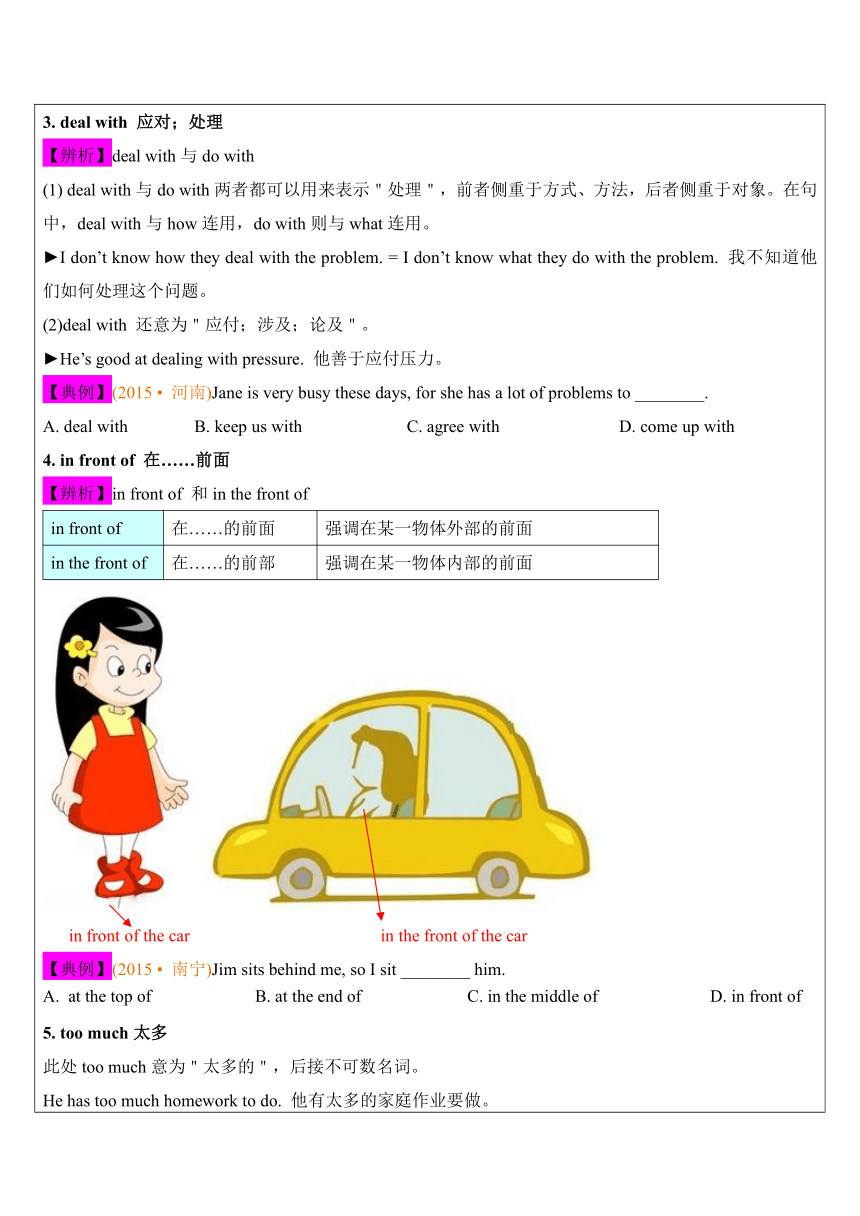
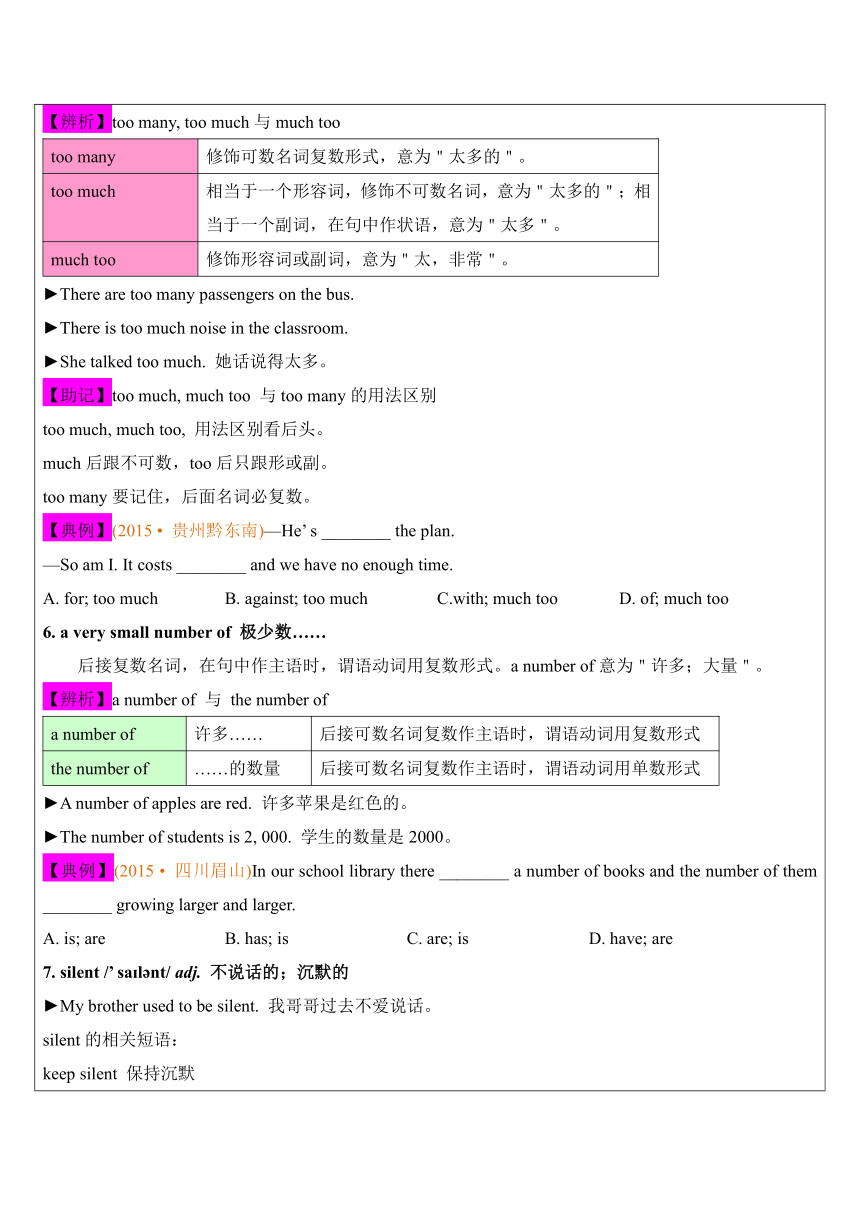
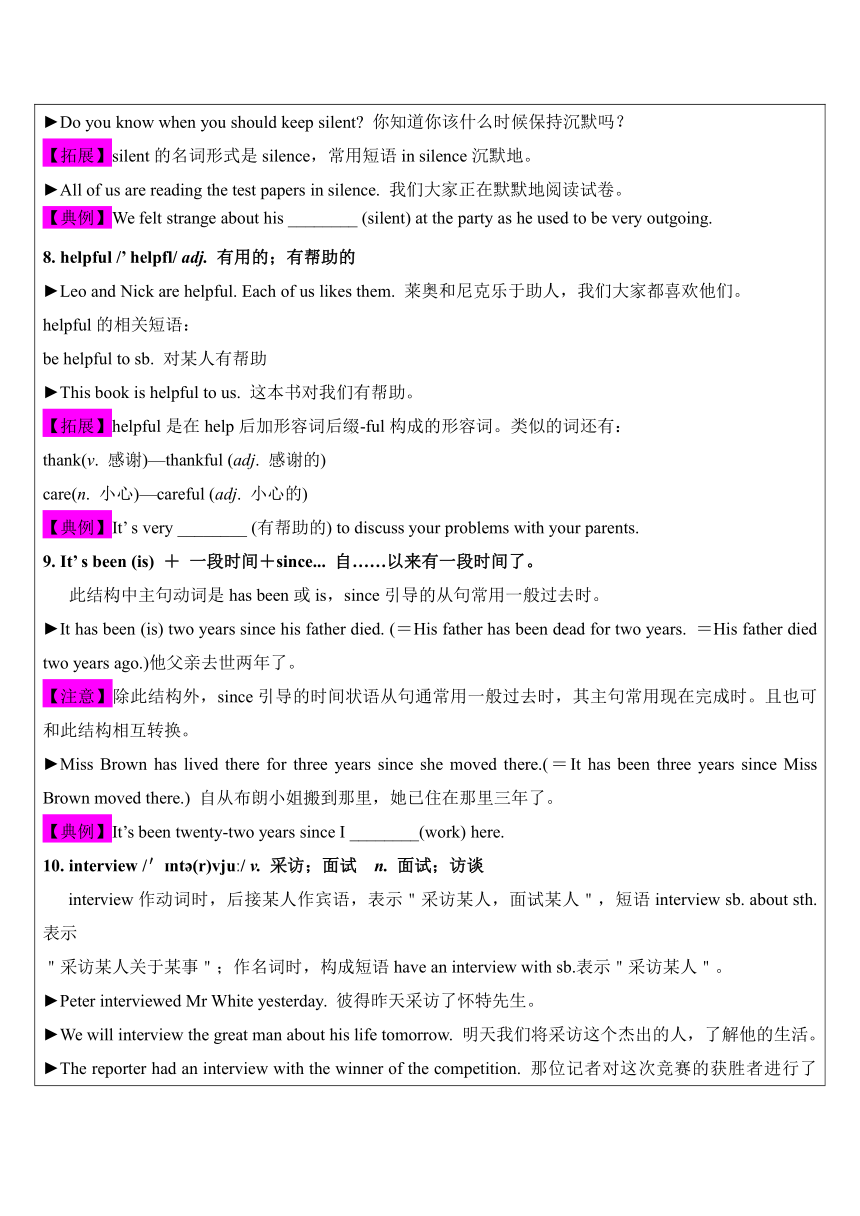
文档简介
学科教师辅导讲义
审核人: 审核时间:
学员姓名: 辅导科目:英语 学科教师: 课时数:2小时
授课类型 T-基础精讲 ★★ C-语法精讲 ★★★ T-课后练习 ★★
授课日期及时段
教学目标 1.Unit7 知识点梳理 2.重点单词、短语 3.灵活运用句型
重点难点 单词辨析 句型运用
1. Mario, you used to be short, didn’t you 马里奥,你过去很矮,是吗? (1)used to意为"过去常常",后接动词原形,表示过去经常发生的动作或存在的状态(暗含现在已经不复存在)。 He used to play basketball at school. 他过去常常在学校里打篮球。 He used to walk to school. 他过去常常步行去上学。 【辨析】used to do sth., be used to do sth.与be used to doing sth. used to do sth.过去常常做某事,只用于过去时态He used to go to sleep at 9 o’ clock in the evening. 他过去常常在晚上9点钟睡觉。be used to do sth.被用于做某事,是被动语态,不定式表目的,可用于多种时态Wood is used to make houses. 木材被用来造房子。be used to doing sth.习惯于做某事,可用于现在、过去、将来等多种时态He is used to going to sleep early.他习惯于早睡。
【典例】Li Ming used _____________ on the right in China, but he soon got used _____________ on the left in England. A. to drive; to drive B. driving; driving C. to driving; to drive D. to drive; to driving (2) 本句是一个反意疑问句,反意疑问句的特点是"前肯后否"或"前否后肯"。 You are a student, aren’t you 你是个学生,对吗? We can’t take books out, can we 我们不能把书拿出去,对吗? 【助记】 3. deal with 应对;处理 【辨析】deal with与do with (1) deal with与do with两者都可以用来表示"处理",前者侧重于方式、方法,后者侧重于对象。在句中,deal with与how连用,do with则与what连用。 I don’t know how they deal with the problem. = I don’t know what they do with the problem. 我不知道他们如何处理这个问题。 (2)deal with 还意为"应付;涉及;论及"。 He’s good at dealing with pressure. 他善于应付压力。 【典例】(2015 河南)Jane is very busy these days, for she has a lot of problems to ________. A. deal with B. keep us with C. agree with D. come up with 4. in front of 在……前面 【辨析】in front of 和in the front of in front of在……的前面强调在某一物体外部的前面in the front of在……的前部强调在某一物体内部的前面
in front of the car in the front of the car 【典例】(2015 南宁)Jim sits behind me, so I sit ________ him. at the top of B. at the end of C. in the middle of D. in front of 5. too much太多 此处too much意为"太多的",后接不可数名词。 He has too much homework to do. 他有太多的家庭作业要做。 【辨析】too many, too much与much too too many修饰可数名词复数形式,意为"太多的"。too much相当于一个形容词,修饰不可数名词,意为"太多的";相当于一个副词,在句中作状语,意为"太多"。much too修饰形容词或副词,意为"太,非常"。
There are too many passengers on the bus. There is too much noise in the classroom. She talked too much. 她话说得太多。 【助记】too much, much too 与too many的用法区别 too much, much too, 用法区别看后头。 much后跟不可数,too后只跟形或副。 too many要记住,后面名词必复数。 【典例】(2015 贵州黔东南)—He’ s ________ the plan. —So am I. It costs ________ and we have no enough time. A. for; too much B. against; too much C.with; much too D. of; much too 6. a very small number of 极少数…… 后接复数名词,在句中作主语时,谓语动词用复数形式。a number of意为"许多;大量"。 【辨析】a number of 与 the number of a number of许多……后接可数名词复数作主语时,谓语动词用复数形式the number of ……的数量后接可数名词复数作主语时,谓语动词用单数形式
A number of apples are red. 许多苹果是红色的。 The number of students is 2, 000. 学生的数量是2000。 【典例】(2015 四川眉山)In our school library there ________ a number of books and the number of them ________ growing larger and larger. A. is; are B. has; is C. are; is D. have; are 7. silent /’ sa l nt/ adj. 不说话的;沉默的 My brother used to be silent. 我哥哥过去不爱说话。 silent的相关短语: keep silent 保持沉默 Do you know when you should keep silent 你知道你该什么时候保持沉默吗? 【拓展】silent的名词形式是silence,常用短语in silence沉默地。 All of us are reading the test papers in silence. 我们大家正在默默地阅读试卷。 【典例】We felt strange about his ________ (silent) at the party as he used to be very outgoing. 8. helpful /’ helpfl/ adj. 有用的;有帮助的 Leo and Nick are helpful. Each of us likes them. 莱奥和尼克乐于助人,我们大家都喜欢他们。 helpful的相关短语: be helpful to sb. 对某人有帮助 This book is helpful to us. 这本书对我们有帮助。 【拓展】helpful是在help后加形容词后缀-ful构成的形容词。类似的词还有: thank(v. 感谢)—thankful (adj. 感谢的) care(n. 小心)—careful (adj. 小心的) 【典例】It’ s very ________ (有帮助的) to discuss your problems with your parents. 9. It’ s been (is) + 一段时间+since... 自……以来有一段时间了。 此结构中主句动词是has been或is,since引导的从句常用一般过去时。 It has been (is) two years since his father died. (=His father has been dead for two years. =His father died two years ago.)他父亲去世两年了。 【注意】除此结构外,since引导的时间状语从句通常用一般过去时,其主句常用现在完成时。且也可和此结构相互转换。 Miss Brown has lived there for three years since she moved there.(=It has been three years since Miss Brown moved there.) 自从布朗小姐搬到那里,她已住在那里三年了。 【典例】It’s been twenty-two years since I ________(work) here. 10. interview /' nt (r)vju / v. 采访;面试 n. 面试;访谈 interview作动词时,后接某人作宾语,表示"采访某人,面试某人",短语interview sb. about sth.表示 "采访某人关于某事";作名词时,构成短语have an interview with sb.表示"采访某人"。 Peter interviewed Mr White yesterday. 彼得昨天采访了怀特先生。 We will interview the great man about his life tomorrow. 明天我们将采访这个杰出的人,了解他的生活。 The reporter had an interview with the winner of the competition. 那位记者对这次竞赛的获胜者进行了采访。 interviewer n. 面试者;采访者 interviewee n. 被访问者;被采访者 12. 19-year-old 十九岁的 He is a 19-year-old young man. 他是一个十九岁的年轻男人。 19-year-old为复合形容词,由"数词+名词(单数)+形容词"构成,而且三者之间要用"-"来连接。用作定语。 【典例】The winner of the singing competition was a ________ girl named Zhang Mei from China. A. 19-years-old B. 19-year-old C. 19-year-olds 13. take up 开始从事 take up此处意为"开始从事",后接名词或动名词作宾语。 They have taken up golf. 他们开始学起打高尔夫球了。 Jack took up running for exercise to lose weight this month. 杰克这个月开始通过跑步锻炼来减肥。 【拓展】take up还可意为"占,占地方"。 Learning English takes up a lot of my time. 学英语占据了我许多时间。 That big table takes up too much room. 那张大桌子占的地方太大了。 【典例】Bob is taking the desks away because they ________ too much room. A. stand up B. pick up C. take up D. listen up 14. It is hard to believe that he used to have difficulties in school. 很难相信他过去在学校有许多困难。 It is hard to believe + that 从句 意为"很难相信……"。此句型中it是形式主语,真正的主语是动词不定式结构to believe...,其中that引导的从句作believe的宾语。 It is hard to believe that she’s only nine.很难相信她只有9岁。 15.advise sb. (not) to do sth.建议某人(不要)做某事 The boss advised him to leave as soon as possible. 老板建议他尽快离开。 【拓展】advise doing sth. 建议做某事 He advised leaving early. 他建议早动身。 【典例】(2015 广东卷)We advise parents ________ their children at home alone in order to keep them away from danger. A. not leave B. not to leave C. leave D. to leave 16. take pride in 为……感到自豪 in为介词,其后可接名词、代词或动词-ing形式。相当于be proud of。 The young mother took pride in her son.=The young mother was proud of her son.这位年轻的妈妈为她的儿子感到自豪。 【拓展】be proud to do sth.意为"为做某事感到骄傲/自豪"。 He is proud to be a student of Tsinghua University. 他为成为清华大学的一名学生而感到自豪。 【典例】(2015 湖北孝感)Jenny’s uncle is a scientist. She is proud _______ him. A. from B. at C. in D. of 17. all the time 一直;始终 The letter is in my pocket all the time. 这封信一直在我的口袋里。 【辨析】all the time与always 词汇 用法 例句 all the time"一直;始终",不表示频率,多置于句末。 They’re running and jumping all the time.他们一直跑呀跳呀。 always频度副词,"总是;永远",表示动作重复、状态持续。 I always go to school on foot.我总是步行去学校。
【拓展】与time相关的短语: once upon a time 从前 in time 及时 on time 准时 many times 多次 ahead of time 提前 at that time 在那时 at the same time 同时 from time to time=sometimes 有时 by the time 到……的时候 for the first time 第一次 have a good time 玩得开心 18. be nervous about 对……很紧张 about可以替换为of。 The horse may be nervous about/of cars. 这匹马可能害怕汽车。 She is really nervous about the interview. 对这次面试她真的很紧张。 19. seldom /’seld m/ adv.不常;很少 seldom相当于hardly ever,反义词是often,通常置于行为动词之前,be动词、情态动词和助动词之后,是一个表示否定意义的副词。 Mr. Brown seldom goes out. 布朗先生很少外出。 I seldom watch TV these days. 这些天我几乎不看电视。 【拓展】频率副词是表示动作发生频率的副词,多与一般现在时连用。常见的频率副词按其频率发生的高低可排列为always (总是,一直)> usually(通常) > often (经常)> sometimes (有时)>seldom(很少) > never (从来没有,从来不)。 【典例】—I hate vegetables. I ________ eat them. —But they are good for your health! You should eat them every day. A. always B. seldom C. often D. usually 20. influence /’ nflu ns/ v. &n. 影响 influence为及物动词,后可直接跟宾语。 My parents have influenced me a lot. 我的父母对我影响很大。 influence作名词用时,与on连用。 Those friends have a bad influence on her. 那些朋友对她有负面影响。 【典例】The actions and words of celebrities(名人) can have a great ________ because many people may follow them. So they should pay more attention to their behavior and speech. A. change B. surprise C. progress D. influence 21. absent /’ bs nt/ adj.缺席;不在 absent的名词形式为absence;反义词为present。常用结构为:be absent from... "缺席……"。 Jim was absent from the meeting yesterday. 吉姆昨天开会缺席了。 【典例】Today he didn’t come to school again. He has been ________ from classes for a week. 22. fail /fe l/ v. 不及格;失败;未能(做到) He failed his driving test. 他驾照考试不及格。 fail in sth.表示"在某方面失败",其反义短语是succeed in sth.。 He failed in business. 他经商失败。 fail to do sth.表示"未做成某事"。 He failed to climb up the tall tree. 他未能爬上那棵高树。 【典例】My parents are always worried about what will happen if I ________. A. succeeded B. won’t succeed C. will fail D. fail 23. be proud of 为……骄傲;感到自豪 be proud of相当于take pride in,其中proud是形容词,意为"自豪的;骄傲的",而pride是名词,意为"自豪;骄傲"。 I am proud of my son.=I take pride in my son. 我为我的儿子感到自豪。 【典例】刘翔虽然告别了他心爱的跨栏,但我们依然以他为骄傲。(自贡) Liu Xiang said goodbye to his loved hurdle, but we are ________ ________ him. 24. in the last few years 在过去的几年里,在近几年里 in/during/over the last/past... years 常与现在完成时连用,是现在完成时的标志之一。 My hometown has changed a lot in the last few years. 在过去的几年里我的家乡发生了很大变化。 Over the past ten years, there have been great changes in the world.在近十年中,世界发生了巨大的变化。 He has sold millions of records in the past two years. 在近两年中他卖掉了数百万张唱片。 Ⅰ. 用单词的适当形式填空。 1. It depends on ________(person)taste. 2. The woman couldn’t say a word because of ________ (sad). 3. Tom’s father was very angry about his ________ (care). 4. What a terrible ________ (decide) he made! He shouldn’t refuse the invitation. 5. It is a good idea ________ (take) my dog out for a walk. 6. Please pay attention to ________(take)care of this baby. II. 从方框中选择合适的单词并用其适当形式完成句子。 (一) speech, British, silent, humorous, guard, private, Europe, Africa, interview, background
1. —Do you teach ________ English or American English —American English. 2. I am a teacher. I have much ________time. 3. Mr. Shi used to be ________. But now he usually talks a lot. 4. Our head teacher made a ________ at the meeting before the winter holiday came. 5. A reporter __________ Mr. President, and they’re talking about the education problems. 6. I have never been to several ________ countries, such as England and France. 7. We should get more information about the ________ of the boy’s family. 8. Egypt(埃及) is an old ________country. It has many ancient buildings like the pyramids(金字塔). 9. Two ________ are sitting at each side of the school gate now. 10. He is very ________. We all like to talk with him. (二) give a speech, be afraid of, keep silent, from time to time, in public
11. His brother is very shy so he hardly shows up ________. 12. The pianist is very old, but he still plays it ________. 13. Being punished by the teacher, the little boy ________ and didn’t say a word for about an hour. 14. The Chief Executive of Hong Kong ____________ to call on people to stay calm and unite together. 15. Don’t ____________ failure. Nobody will succeed until he tries hard. used to的用法 构成used to + 动词原形He used to play basketball after school. 他过去常常放学后打篮球。用法表示过去的习惯动作或状态,暗含现在已不再发生或不存在。其中to为不定式符号,后接动词原形He used to be a very poor man.他过去是一个很穷的人。(暗指现在已经不穷了)句型变化否定句Used not to, usedn’t to 或didn’t use toShe didn’t use to have long hair.=(She usedn’t to have long hair.) 她过去不留长发。一般疑问句Did sb. use to... /Used sb. to... Did you use to play the piano =Used you to play the piano 你过去常常弹钢琴吗?反意疑问句附加疑问部分可用didn’t或usedn’tHe didn’t use to drink, did he 他过去不经常喝酒,对吗? He used to drink, usedn’t he 他过去常常喝酒,对吗?相似短语be/get/become used to doing sth. 习惯于做某事My grandfather is used to going for a walk after dinner. 我爷爷习惯于饭后去散步。be used to do sth. 被用于做某事Wood can be used to make paper. 木头能用来造纸。
【魔法记忆】口诀法记忆used to:过去常常used to,既无人称也无数;后接动词用原形,否定形式两情形;didn’t use to是其一,used后加not也可行;疑问句结构更简单,借来Did句首添。 【典例】(2014 四川南充)She used to __________ a bus to school, but now she is used to __________ to school. A. taking; walk B. take; walk C. taking; walking D. take; walking I. 根据汉语提示完成句子。 1. 如果你不知道事实,请保持沉默。 If you don’ t know the truth, please keep________. 2. 令人吃惊的是,我们的新操场占了学校一半多的面积。 It’ s amazing that our new playground________ ________more than half of the school area. 3. —How did you ________ ________ (对付) that naughty boy —By talking to him. 4. There were ________ ________ ________ ________ (一小部分) students on the playground. ________ ________ ________(……的数目) them was forty five. 5. Be quiet!Our manager is ________(面试) a ________ (十六岁的) girl in the meeting room. 6. Many students are waiting for the job __________(面试). 7. The teacher ________(要求) us to clean the classroom after class every day. 8. There are two ________(警卫) in our school every day. 9. A science teacher gave a ________(讲话) for us last Friday. 10. The little girl doesn’ t ________ (敢) to go out by herself. II. 根据句意及首字母提示完成单词。 1. There is an A________ map on the wall. We can find China on it. 2. Tom s________ two goals before half time(中场休息时间). 3. Yesterday my father took a picture of me with the sea in the b________. 4. Mary was born in England. So she speaks B________ English. 5. It is impolite to read other people’s p________ letters. III. 选词填空。 1. I saw a cat ________ (climbing/to climb) the tree to catch a bird. 2. Gina will take up __________ (play/playing) the piano next year. 3. Lily required us ________ (help/to help) her after school. 4. She used to ________ (walk/walking) to school. 5. I have already ________ (deal/dealt) with the problem. IV 阅读理解。 I used to be selfish(自私的), I should say. But one moment changed me. I was on my lunch break and had left the school to get something to eat .On the way, I saw a man playing the guitar, with a hat in front of him. I had some coins in my pocket, but I would not give them to him, thinking to myself he would use the money to buy drugs or alcohol(毒品或酒). He looked like that type of man, young and ragged. But I then realized I had no right to place myself above him just because he was praying for money. I stopped and dropped all the coins into his hat, and he smiled at me, I watched for a while. Selfish as it sounds, I expected something more to come from that moment—like a feeling of happiness or so. But nothing happened, I walked off. "It seemed to be a waste of money ,"I thought. On my way home at the end of the day, I saw the man again and he was packing up .I watched him pick up the hat and walk to a store. There he poured the all the money into a box, which was used to collect money for the people after an earthquake(地震). He was praying for charity(慈善)! Now I give any coin I have to charity boxes and enjoy the feeling of giving. 1. What did the writer use to be like A. Kind. B. Selfish. C. Clever. D. Friendly. 2. When did the writer see a man playing for money A. In the morning. B. At noon. C. In the afternoon. D. At night. 3. What does the underlined word "ragged" mean in this passage A. 精力充沛的 B. 乐于助人的 C. 骄傲自大的 D. 衣衫褴褛的 4. Which of the following is NOT true A. The writer didn’t want to give the money to the man at first. B. The writer felt very happy after giving the money to the man. C. The writer saw the man twice that day. D. The man gave all the money he had to the charity. 5. We can learn from the passage that now the writer __________. A. is a friend of the young man B. enjoys helping others C. is saving money for the poor D. enjoys collecting coins
审核人: 审核时间:
学员姓名: 辅导科目:英语 学科教师: 课时数:2小时
授课类型 T-基础精讲 ★★ C-语法精讲 ★★★ T-课后练习 ★★
授课日期及时段
教学目标 1.Unit7 知识点梳理 2.重点单词、短语 3.灵活运用句型
重点难点 单词辨析 句型运用
1. Mario, you used to be short, didn’t you 马里奥,你过去很矮,是吗? (1)used to意为"过去常常",后接动词原形,表示过去经常发生的动作或存在的状态(暗含现在已经不复存在)。 He used to play basketball at school. 他过去常常在学校里打篮球。 He used to walk to school. 他过去常常步行去上学。 【辨析】used to do sth., be used to do sth.与be used to doing sth. used to do sth.过去常常做某事,只用于过去时态He used to go to sleep at 9 o’ clock in the evening. 他过去常常在晚上9点钟睡觉。be used to do sth.被用于做某事,是被动语态,不定式表目的,可用于多种时态Wood is used to make houses. 木材被用来造房子。be used to doing sth.习惯于做某事,可用于现在、过去、将来等多种时态He is used to going to sleep early.他习惯于早睡。
【典例】Li Ming used _____________ on the right in China, but he soon got used _____________ on the left in England. A. to drive; to drive B. driving; driving C. to driving; to drive D. to drive; to driving (2) 本句是一个反意疑问句,反意疑问句的特点是"前肯后否"或"前否后肯"。 You are a student, aren’t you 你是个学生,对吗? We can’t take books out, can we 我们不能把书拿出去,对吗? 【助记】 3. deal with 应对;处理 【辨析】deal with与do with (1) deal with与do with两者都可以用来表示"处理",前者侧重于方式、方法,后者侧重于对象。在句中,deal with与how连用,do with则与what连用。 I don’t know how they deal with the problem. = I don’t know what they do with the problem. 我不知道他们如何处理这个问题。 (2)deal with 还意为"应付;涉及;论及"。 He’s good at dealing with pressure. 他善于应付压力。 【典例】(2015 河南)Jane is very busy these days, for she has a lot of problems to ________. A. deal with B. keep us with C. agree with D. come up with 4. in front of 在……前面 【辨析】in front of 和in the front of in front of在……的前面强调在某一物体外部的前面in the front of在……的前部强调在某一物体内部的前面
in front of the car in the front of the car 【典例】(2015 南宁)Jim sits behind me, so I sit ________ him. at the top of B. at the end of C. in the middle of D. in front of 5. too much太多 此处too much意为"太多的",后接不可数名词。 He has too much homework to do. 他有太多的家庭作业要做。 【辨析】too many, too much与much too too many修饰可数名词复数形式,意为"太多的"。too much相当于一个形容词,修饰不可数名词,意为"太多的";相当于一个副词,在句中作状语,意为"太多"。much too修饰形容词或副词,意为"太,非常"。
There are too many passengers on the bus. There is too much noise in the classroom. She talked too much. 她话说得太多。 【助记】too much, much too 与too many的用法区别 too much, much too, 用法区别看后头。 much后跟不可数,too后只跟形或副。 too many要记住,后面名词必复数。 【典例】(2015 贵州黔东南)—He’ s ________ the plan. —So am I. It costs ________ and we have no enough time. A. for; too much B. against; too much C.with; much too D. of; much too 6. a very small number of 极少数…… 后接复数名词,在句中作主语时,谓语动词用复数形式。a number of意为"许多;大量"。 【辨析】a number of 与 the number of a number of许多……后接可数名词复数作主语时,谓语动词用复数形式the number of ……的数量后接可数名词复数作主语时,谓语动词用单数形式
A number of apples are red. 许多苹果是红色的。 The number of students is 2, 000. 学生的数量是2000。 【典例】(2015 四川眉山)In our school library there ________ a number of books and the number of them ________ growing larger and larger. A. is; are B. has; is C. are; is D. have; are 7. silent /’ sa l nt/ adj. 不说话的;沉默的 My brother used to be silent. 我哥哥过去不爱说话。 silent的相关短语: keep silent 保持沉默 Do you know when you should keep silent 你知道你该什么时候保持沉默吗? 【拓展】silent的名词形式是silence,常用短语in silence沉默地。 All of us are reading the test papers in silence. 我们大家正在默默地阅读试卷。 【典例】We felt strange about his ________ (silent) at the party as he used to be very outgoing. 8. helpful /’ helpfl/ adj. 有用的;有帮助的 Leo and Nick are helpful. Each of us likes them. 莱奥和尼克乐于助人,我们大家都喜欢他们。 helpful的相关短语: be helpful to sb. 对某人有帮助 This book is helpful to us. 这本书对我们有帮助。 【拓展】helpful是在help后加形容词后缀-ful构成的形容词。类似的词还有: thank(v. 感谢)—thankful (adj. 感谢的) care(n. 小心)—careful (adj. 小心的) 【典例】It’ s very ________ (有帮助的) to discuss your problems with your parents. 9. It’ s been (is) + 一段时间+since... 自……以来有一段时间了。 此结构中主句动词是has been或is,since引导的从句常用一般过去时。 It has been (is) two years since his father died. (=His father has been dead for two years. =His father died two years ago.)他父亲去世两年了。 【注意】除此结构外,since引导的时间状语从句通常用一般过去时,其主句常用现在完成时。且也可和此结构相互转换。 Miss Brown has lived there for three years since she moved there.(=It has been three years since Miss Brown moved there.) 自从布朗小姐搬到那里,她已住在那里三年了。 【典例】It’s been twenty-two years since I ________(work) here. 10. interview /' nt (r)vju / v. 采访;面试 n. 面试;访谈 interview作动词时,后接某人作宾语,表示"采访某人,面试某人",短语interview sb. about sth.表示 "采访某人关于某事";作名词时,构成短语have an interview with sb.表示"采访某人"。 Peter interviewed Mr White yesterday. 彼得昨天采访了怀特先生。 We will interview the great man about his life tomorrow. 明天我们将采访这个杰出的人,了解他的生活。 The reporter had an interview with the winner of the competition. 那位记者对这次竞赛的获胜者进行了采访。 interviewer n. 面试者;采访者 interviewee n. 被访问者;被采访者 12. 19-year-old 十九岁的 He is a 19-year-old young man. 他是一个十九岁的年轻男人。 19-year-old为复合形容词,由"数词+名词(单数)+形容词"构成,而且三者之间要用"-"来连接。用作定语。 【典例】The winner of the singing competition was a ________ girl named Zhang Mei from China. A. 19-years-old B. 19-year-old C. 19-year-olds 13. take up 开始从事 take up此处意为"开始从事",后接名词或动名词作宾语。 They have taken up golf. 他们开始学起打高尔夫球了。 Jack took up running for exercise to lose weight this month. 杰克这个月开始通过跑步锻炼来减肥。 【拓展】take up还可意为"占,占地方"。 Learning English takes up a lot of my time. 学英语占据了我许多时间。 That big table takes up too much room. 那张大桌子占的地方太大了。 【典例】Bob is taking the desks away because they ________ too much room. A. stand up B. pick up C. take up D. listen up 14. It is hard to believe that he used to have difficulties in school. 很难相信他过去在学校有许多困难。 It is hard to believe + that 从句 意为"很难相信……"。此句型中it是形式主语,真正的主语是动词不定式结构to believe...,其中that引导的从句作believe的宾语。 It is hard to believe that she’s only nine.很难相信她只有9岁。 15.advise sb. (not) to do sth.建议某人(不要)做某事 The boss advised him to leave as soon as possible. 老板建议他尽快离开。 【拓展】advise doing sth. 建议做某事 He advised leaving early. 他建议早动身。 【典例】(2015 广东卷)We advise parents ________ their children at home alone in order to keep them away from danger. A. not leave B. not to leave C. leave D. to leave 16. take pride in 为……感到自豪 in为介词,其后可接名词、代词或动词-ing形式。相当于be proud of。 The young mother took pride in her son.=The young mother was proud of her son.这位年轻的妈妈为她的儿子感到自豪。 【拓展】be proud to do sth.意为"为做某事感到骄傲/自豪"。 He is proud to be a student of Tsinghua University. 他为成为清华大学的一名学生而感到自豪。 【典例】(2015 湖北孝感)Jenny’s uncle is a scientist. She is proud _______ him. A. from B. at C. in D. of 17. all the time 一直;始终 The letter is in my pocket all the time. 这封信一直在我的口袋里。 【辨析】all the time与always 词汇 用法 例句 all the time"一直;始终",不表示频率,多置于句末。 They’re running and jumping all the time.他们一直跑呀跳呀。 always频度副词,"总是;永远",表示动作重复、状态持续。 I always go to school on foot.我总是步行去学校。
【拓展】与time相关的短语: once upon a time 从前 in time 及时 on time 准时 many times 多次 ahead of time 提前 at that time 在那时 at the same time 同时 from time to time=sometimes 有时 by the time 到……的时候 for the first time 第一次 have a good time 玩得开心 18. be nervous about 对……很紧张 about可以替换为of。 The horse may be nervous about/of cars. 这匹马可能害怕汽车。 She is really nervous about the interview. 对这次面试她真的很紧张。 19. seldom /’seld m/ adv.不常;很少 seldom相当于hardly ever,反义词是often,通常置于行为动词之前,be动词、情态动词和助动词之后,是一个表示否定意义的副词。 Mr. Brown seldom goes out. 布朗先生很少外出。 I seldom watch TV these days. 这些天我几乎不看电视。 【拓展】频率副词是表示动作发生频率的副词,多与一般现在时连用。常见的频率副词按其频率发生的高低可排列为always (总是,一直)> usually(通常) > often (经常)> sometimes (有时)>seldom(很少) > never (从来没有,从来不)。 【典例】—I hate vegetables. I ________ eat them. —But they are good for your health! You should eat them every day. A. always B. seldom C. often D. usually 20. influence /’ nflu ns/ v. &n. 影响 influence为及物动词,后可直接跟宾语。 My parents have influenced me a lot. 我的父母对我影响很大。 influence作名词用时,与on连用。 Those friends have a bad influence on her. 那些朋友对她有负面影响。 【典例】The actions and words of celebrities(名人) can have a great ________ because many people may follow them. So they should pay more attention to their behavior and speech. A. change B. surprise C. progress D. influence 21. absent /’ bs nt/ adj.缺席;不在 absent的名词形式为absence;反义词为present。常用结构为:be absent from... "缺席……"。 Jim was absent from the meeting yesterday. 吉姆昨天开会缺席了。 【典例】Today he didn’t come to school again. He has been ________ from classes for a week. 22. fail /fe l/ v. 不及格;失败;未能(做到) He failed his driving test. 他驾照考试不及格。 fail in sth.表示"在某方面失败",其反义短语是succeed in sth.。 He failed in business. 他经商失败。 fail to do sth.表示"未做成某事"。 He failed to climb up the tall tree. 他未能爬上那棵高树。 【典例】My parents are always worried about what will happen if I ________. A. succeeded B. won’t succeed C. will fail D. fail 23. be proud of 为……骄傲;感到自豪 be proud of相当于take pride in,其中proud是形容词,意为"自豪的;骄傲的",而pride是名词,意为"自豪;骄傲"。 I am proud of my son.=I take pride in my son. 我为我的儿子感到自豪。 【典例】刘翔虽然告别了他心爱的跨栏,但我们依然以他为骄傲。(自贡) Liu Xiang said goodbye to his loved hurdle, but we are ________ ________ him. 24. in the last few years 在过去的几年里,在近几年里 in/during/over the last/past... years 常与现在完成时连用,是现在完成时的标志之一。 My hometown has changed a lot in the last few years. 在过去的几年里我的家乡发生了很大变化。 Over the past ten years, there have been great changes in the world.在近十年中,世界发生了巨大的变化。 He has sold millions of records in the past two years. 在近两年中他卖掉了数百万张唱片。 Ⅰ. 用单词的适当形式填空。 1. It depends on ________(person)taste. 2. The woman couldn’t say a word because of ________ (sad). 3. Tom’s father was very angry about his ________ (care). 4. What a terrible ________ (decide) he made! He shouldn’t refuse the invitation. 5. It is a good idea ________ (take) my dog out for a walk. 6. Please pay attention to ________(take)care of this baby. II. 从方框中选择合适的单词并用其适当形式完成句子。 (一) speech, British, silent, humorous, guard, private, Europe, Africa, interview, background
1. —Do you teach ________ English or American English —American English. 2. I am a teacher. I have much ________time. 3. Mr. Shi used to be ________. But now he usually talks a lot. 4. Our head teacher made a ________ at the meeting before the winter holiday came. 5. A reporter __________ Mr. President, and they’re talking about the education problems. 6. I have never been to several ________ countries, such as England and France. 7. We should get more information about the ________ of the boy’s family. 8. Egypt(埃及) is an old ________country. It has many ancient buildings like the pyramids(金字塔). 9. Two ________ are sitting at each side of the school gate now. 10. He is very ________. We all like to talk with him. (二) give a speech, be afraid of, keep silent, from time to time, in public
11. His brother is very shy so he hardly shows up ________. 12. The pianist is very old, but he still plays it ________. 13. Being punished by the teacher, the little boy ________ and didn’t say a word for about an hour. 14. The Chief Executive of Hong Kong ____________ to call on people to stay calm and unite together. 15. Don’t ____________ failure. Nobody will succeed until he tries hard. used to的用法 构成used to + 动词原形He used to play basketball after school. 他过去常常放学后打篮球。用法表示过去的习惯动作或状态,暗含现在已不再发生或不存在。其中to为不定式符号,后接动词原形He used to be a very poor man.他过去是一个很穷的人。(暗指现在已经不穷了)句型变化否定句Used not to, usedn’t to 或didn’t use toShe didn’t use to have long hair.=(She usedn’t to have long hair.) 她过去不留长发。一般疑问句Did sb. use to... /Used sb. to... Did you use to play the piano =Used you to play the piano 你过去常常弹钢琴吗?反意疑问句附加疑问部分可用didn’t或usedn’tHe didn’t use to drink, did he 他过去不经常喝酒,对吗? He used to drink, usedn’t he 他过去常常喝酒,对吗?相似短语be/get/become used to doing sth. 习惯于做某事My grandfather is used to going for a walk after dinner. 我爷爷习惯于饭后去散步。be used to do sth. 被用于做某事Wood can be used to make paper. 木头能用来造纸。
【魔法记忆】口诀法记忆used to:过去常常used to,既无人称也无数;后接动词用原形,否定形式两情形;didn’t use to是其一,used后加not也可行;疑问句结构更简单,借来Did句首添。 【典例】(2014 四川南充)She used to __________ a bus to school, but now she is used to __________ to school. A. taking; walk B. take; walk C. taking; walking D. take; walking I. 根据汉语提示完成句子。 1. 如果你不知道事实,请保持沉默。 If you don’ t know the truth, please keep________. 2. 令人吃惊的是,我们的新操场占了学校一半多的面积。 It’ s amazing that our new playground________ ________more than half of the school area. 3. —How did you ________ ________ (对付) that naughty boy —By talking to him. 4. There were ________ ________ ________ ________ (一小部分) students on the playground. ________ ________ ________(……的数目) them was forty five. 5. Be quiet!Our manager is ________(面试) a ________ (十六岁的) girl in the meeting room. 6. Many students are waiting for the job __________(面试). 7. The teacher ________(要求) us to clean the classroom after class every day. 8. There are two ________(警卫) in our school every day. 9. A science teacher gave a ________(讲话) for us last Friday. 10. The little girl doesn’ t ________ (敢) to go out by herself. II. 根据句意及首字母提示完成单词。 1. There is an A________ map on the wall. We can find China on it. 2. Tom s________ two goals before half time(中场休息时间). 3. Yesterday my father took a picture of me with the sea in the b________. 4. Mary was born in England. So she speaks B________ English. 5. It is impolite to read other people’s p________ letters. III. 选词填空。 1. I saw a cat ________ (climbing/to climb) the tree to catch a bird. 2. Gina will take up __________ (play/playing) the piano next year. 3. Lily required us ________ (help/to help) her after school. 4. She used to ________ (walk/walking) to school. 5. I have already ________ (deal/dealt) with the problem. IV 阅读理解。 I used to be selfish(自私的), I should say. But one moment changed me. I was on my lunch break and had left the school to get something to eat .On the way, I saw a man playing the guitar, with a hat in front of him. I had some coins in my pocket, but I would not give them to him, thinking to myself he would use the money to buy drugs or alcohol(毒品或酒). He looked like that type of man, young and ragged. But I then realized I had no right to place myself above him just because he was praying for money. I stopped and dropped all the coins into his hat, and he smiled at me, I watched for a while. Selfish as it sounds, I expected something more to come from that moment—like a feeling of happiness or so. But nothing happened, I walked off. "It seemed to be a waste of money ,"I thought. On my way home at the end of the day, I saw the man again and he was packing up .I watched him pick up the hat and walk to a store. There he poured the all the money into a box, which was used to collect money for the people after an earthquake(地震). He was praying for charity(慈善)! Now I give any coin I have to charity boxes and enjoy the feeling of giving. 1. What did the writer use to be like A. Kind. B. Selfish. C. Clever. D. Friendly. 2. When did the writer see a man playing for money A. In the morning. B. At noon. C. In the afternoon. D. At night. 3. What does the underlined word "ragged" mean in this passage A. 精力充沛的 B. 乐于助人的 C. 骄傲自大的 D. 衣衫褴褛的 4. Which of the following is NOT true A. The writer didn’t want to give the money to the man at first. B. The writer felt very happy after giving the money to the man. C. The writer saw the man twice that day. D. The man gave all the money he had to the charity. 5. We can learn from the passage that now the writer __________. A. is a friend of the young man B. enjoys helping others C. is saving money for the poor D. enjoys collecting coins
同课章节目录
- Unit 1 When was heborn?
- Section A
- Section B
- Unit 2 It's a nice day, isn't it?
- Section A
- Section B
- Unit 3 Where would you like to visit?
- Section A
- Section B
- Unit 4 How can we become good learners?
- Section A
- Section B
- Unit 5 I think that mooncakes are delicious!
- Section A
- Section B
- Unit 6 Could you please tell me where the restroom
- Section A
- Section B
- Unit 7 I used to be afraid of the dark.
- Section A
- Section B
- Unit 8 What are the shirts made of?
- Section A
- Section B
